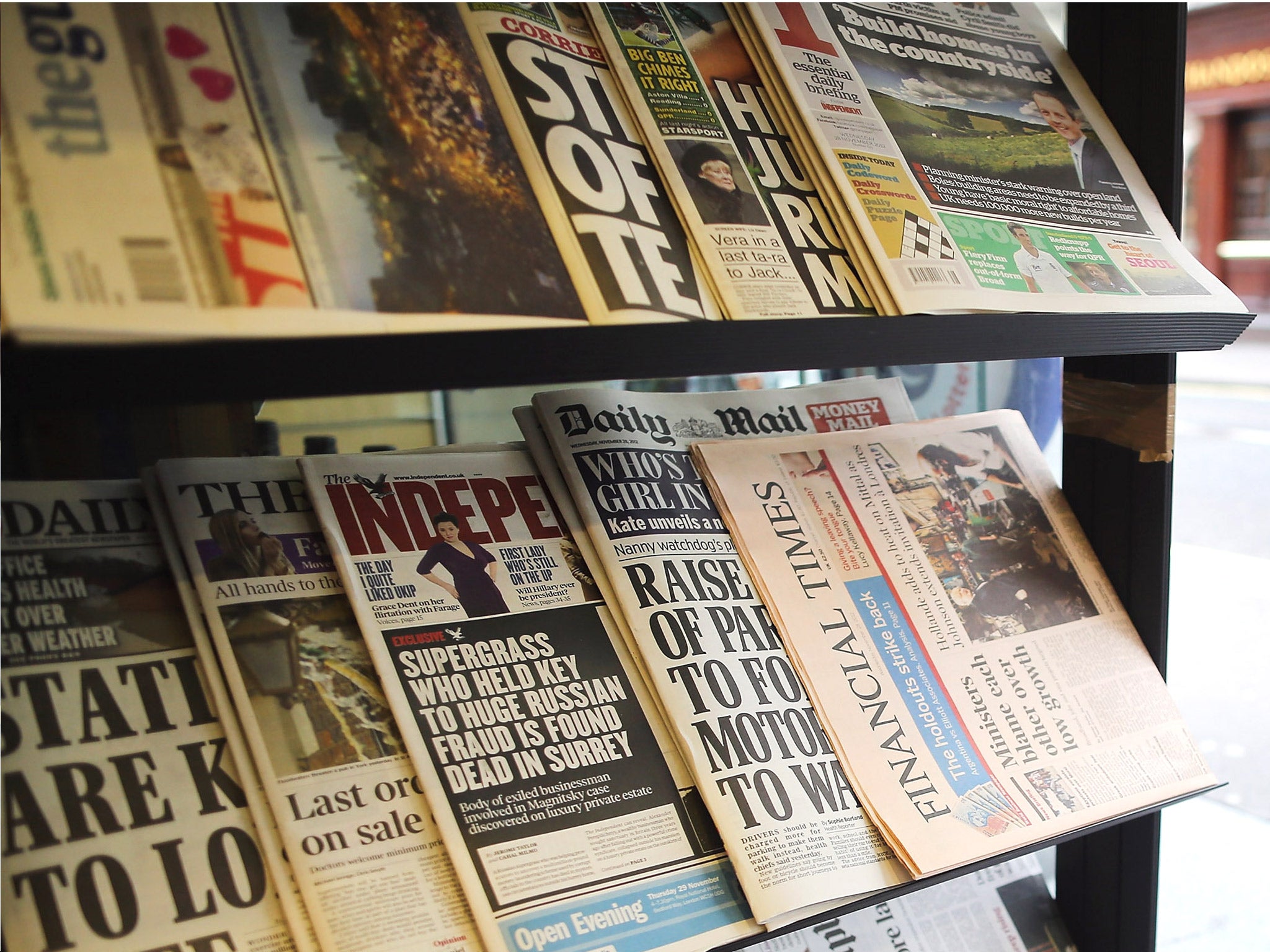Newspaper editors call on colleagues to debate Leveson proposals for press reform openly

Your support helps us to tell the story
From reproductive rights to climate change to Big Tech, The Independent is on the ground when the story is developing. Whether it's investigating the financials of Elon Musk's pro-Trump PAC or producing our latest documentary, 'The A Word', which shines a light on the American women fighting for reproductive rights, we know how important it is to parse out the facts from the messaging.
At such a critical moment in US history, we need reporters on the ground. Your donation allows us to keep sending journalists to speak to both sides of the story.
The Independent is trusted by Americans across the entire political spectrum. And unlike many other quality news outlets, we choose not to lock Americans out of our reporting and analysis with paywalls. We believe quality journalism should be available to everyone, paid for by those who can afford it.
Your support makes all the difference.Three leading quality newspapers have appealed to their industry colleagues to show greater transparency and abandon “closed-door negotiations” over Lord Justice Leveson’s proposals for reforming the press.
The editors of the Financial Times, The Independent and The Guardian have broken ranks with the rest of the industry by expressing support for press regulation introduced by a Royal Charter underpinned by statute.
But they have also voiced concerns about various recommendations made by Lord Justice Leveson, including the suggestion that newspapers which do not sign up to a new regulatory system should be subject to exemplary damages when complaints against them are upheld. The editors argue that such a measure “would be a chill on free expression”.
In an open letter to Paul Vickers of Trinity Mirror and Peter Wright of Associated Newspapers – the senior executives leading the newspaper industry in the negotiations – Lionel Barber of the Financial Times, Chris Blackhurst of The Independent and Alan Rusbridger of The Guardian called for greater openness from the newspaper industry.
“It is clear to us that closed-door negotiations with the Conservatives have so far failed to generate a politically acceptable outcome and the process has alienated stakeholders in the debate, including party leaders and parliamentarians,” they wrote.
The three editors have been concerned by recent events in Parliament, where there is concern at the lack of progress in responding to Lord Justice Leveson’s proposals. An amendment to the Defamation Bill, introduced by the Labour peer Lord Puttnam to force the pace on press reform, threatens to derail three years of work to reform Britain’s libel laws. “We think it is vital that a new, more open approach is taken as soon as possible to avoid the fall of the Defamation Bill,” the letter continues.
The initiative will encourage the Labour Party, which has long argued that Lord Justice Leveson’s proposals could not be introduced without the use of some element of statute. But the Conservatives have been adamant that it is possible to implement the judge’s report without recourse to law.
The editors said they “understand” the argument that any form of press law could be a “slippery slope” to political interference in the media. But they said the “single clause” of statutory underpinning “would not bear directly on the press itself, or even on the regulator” but would “simply give greater stability to the body which would recognise the work of the regulator”. A statutory underpinning would preserve the integrity of the Royal Charter by ensuring ministers were unable to change it “without recourse to Parliament”.
Difficulties in cross-party talks yesterday meant the probable postponement of a planned meeting between the three party leaders today to discuss progress.
Lord Hunt, the chairman of the Press Complaints Commission, has appointed Lord Phillips, the former president of the Supreme Court, to head a group which will choose the appointment panel for the new regulator. The three editors said the industry should seek “an early meeting” with Lord Phillips and Sir David Normington, the Commissioner for Public Appointments who is overseeing the process.
Road to reform: The key players
Oliver Letwin
The Minister of State for Policy has been the driving force behind the idea of a Royal Charter that would allow regulation of the press to be reformed without the need for legislation.
David Cameron
The Prime Minister instantly rejected the idea of statute after the publication of the Leveson report, saying it “would mean for the first time that we have crossed the Rubicon of writing elements of press regulation into the law of the land”.
Harriet Harman
The shadow Culture Secretary has led Labour’s case that Lord Justice Leveson’s proposals could not be introduced without some statute.
Lord Skidelsky
The cross-bench peer introduced a Leveson amendment to the Enterprise and Regulatory Reform Bill, which would mean that if any major publisher dropped out of a new self-regulatory system then the scheme would become mandatory.
Lord Puttnam
The Labour peer entered a radical amendment to the Defamation Bill, which was criticised by freedom of speech campaigners as “illiberal”. It originally included a proposal for newspapers to seek prior approval of stories from the regulator or risk exemplary damages.
Join our commenting forum
Join thought-provoking conversations, follow other Independent readers and see their replies
Comments